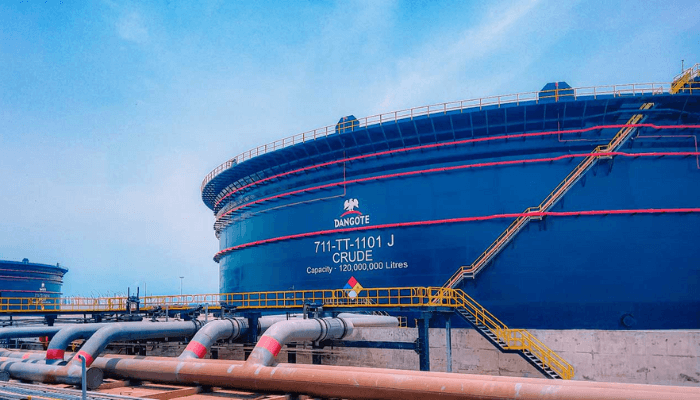Nigeria’s industrial landscape is on the brink of a transformative shift as the Dangote Refinery, Africa’s largest single-train oil refinery, has begun producing polypropylene—a versatile plastic critical to a wide range of manufacturing sectors. This milestone, which builds on earlier announcements of production starting in October 2024, but later took off just yesterday promises to reduce Nigeria’s reliance on imported raw materials, bolster local industries, and position the country as a potential exporter of polymeric products. With the refinery nearing its full operational capacity of 650,000 barrels per day, the implications for Nigeria’s economy are profound, signaling a new era of self-sufficiency and industrial growth.
Polypropylene, a thermoplastic polymer, is a cornerstone of modern manufacturing. It is used in everything from packaging materials like plastic bags and containers to textiles, automotive components, and medical equipment. Until recently, Nigeria has imported vast quantities of this essential material, with annual imports valued at approximately $267.7 million, peaking at $407 million in 2022, according to TradeMap data. The National Bureau of Statistics reported that in the first quarter of 2024 alone, Nigeria spent N99.6 billion on polypropylene imports, making it the country’s 12th most imported product.
The commencement of polypropylene production at the Dangote Refinery changes this narrative. Aliko Dangote, Chairman of the Dangote Group, has emphasized that the refinery is now equipped to meet 100% of Nigeria’s domestic demand for polypropylene. “We are committed to ensuring that there will be no need to import polypropylene,” Dangote stated in a recent address. “Our petrochemical plant will be fully capable of meeting all local demands.” This shift is expected to alleviate the burden on local manufacturers who have long grappled with foreign exchange shortages, high import costs, and lengthy shipping delays.
Industries such as packaging, textiles, and automotive manufacturing—previously hampered by the need to stockpile imported materials for months—are poised to benefit significantly. For instance, the packaging sector, which includes Dangote’s own packaging division, is one of the largest consumers of polypropylene in Nigeria. With a reliable domestic supply, companies can reduce production costs, improve efficiency, and pass savings on to consumers. Similarly, the textile and automotive sectors, which rely on polypropylene for fibers and durable parts, can now scale operations without the uncertainty of import logistics.
The economic implications of this development extend far beyond the manufacturing floor. By curbing Nigeria’s $268 million annual polypropylene import bill, the Dangote Refinery is freeing up foreign exchange reserves that can be redirected to other critical areas of the economy. This reduction in import dependency aligns with the Nigerian government’s broader import substitution strategy, aimed at strengthening the naira and reducing inflationary pressures. Posts on X have echoed this sentiment, with users noting that the move could stabilize the currency and lower the cost of goods reliant on polymeric materials.
Read Also: New 100,000 bpd refinery emerges from Port Harcourt Refinery as NCDMB acquires 20% equity
Moreover, the availability of locally produced polypropylene is expected to spark a wave of industrial activity. As raw materials become more accessible and affordable, entrepreneurs and investors are likely to establish new factories and processing plants, particularly in the plastics, rubber, and nylon sectors. Nigeria could soon transition from being a net importer to a regional exporter of these products, tapping into markets across Africa and beyond. The refinery’s capacity to produce 900,000 metric tonnes of polypropylene annually—alongside other petrochemicals like polyethylene—positions it as a potential hub for polymer production on the continent.
Job creation is another significant upside. The refinery itself has already generated thousands of direct and indirect jobs, and the expansion of downstream industries fueled by polypropylene production could create tens of thousands more. From factory workers to logistics providers, the ripple effects of this industrial boom could uplift communities and reduce unemployment, a persistent challenge in Nigeria’s youthful population of over 200 million.
While the outlook is promising, the journey to this point has not been without hurdles. The Dangote Refinery, a $19 billion project, faced delays due to financing issues, crude oil supply constraints, and logistical challenges since its groundbreaking in 2016. Even after commencing diesel and aviation fuel production in January 2024, followed by petrol in September, securing a steady supply of crude oil has remained a concern. The refinery has relied on imports from the United States and deliveries from the Nigerian National Petroleum Company Limited (NNPC), highlighting the need for increased domestic oil production to fully realize its potential.
Additionally, the transition to local polypropylene production may face teething problems. Manufacturers accustomed to imported materials will need to adapt to the specifications and pricing of Dangote’s output. There’s also the question of competition—countries like Saudi Arabia, South Africa, South Korea, China, and Vietnam, which supplied 90% of Nigeria’s polypropylene in early 2024, may not cede market share easily. However, the cost advantages of domestic production, coupled with reduced shipping times, give Nigerian industries a competitive edge.
The Dangote Refinery’s foray into polypropylene production is more than a business milestone—it’s a symbol of Nigeria’s industrial ambition. For decades, the country has been paradoxized by its reliance on imports despite its vast natural resources. As one observer on X noted, “Nigeria imports toothpicks despite having bamboo, starch despite being the world’s largest cassava producer—now, this narrative is changing.” The refinery’s ability to produce high-quality petrochemicals domestically challenges the status quo and sets a precedent for self-reliance.
President Bola Tinubu’s administration has supported this vision, with policies like the “naira for crude” initiative facilitating local transactions and reducing dollar dependency. Aliko Dangote has credited this conducive environment for enabling the refinery’s success, stating, “The government has created the conditions for us to thrive and achieve this monumental task.”
As the Dangote Refinery begins polypropylene production, Nigeria stands at a crossroads. The potential for a manufacturing boom is clear: lower costs, increased production capacity, and new export opportunities could redefine the nation’s economic trajectory. Yet, success will depend on sustained investment, reliable crude supply, and the ability of local industries to seize this moment.






